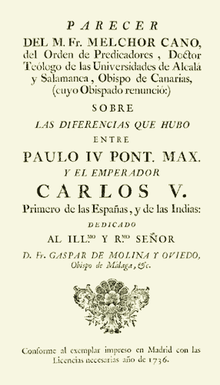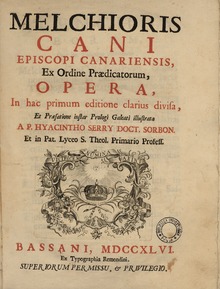Melchior Cano
Melchior Cano (born January 6, 1509 in Tarancón , † September 30, 1560 in Toledo ) was a Spanish Dominican and theologian . He was the author of the influential De locis theologicis and is therefore considered the founder of Catholic fundamental theology . He was an important representative of the Salamanca School .
Life
Melchior Cano entered the Dominican Order in Salamanca in 1523 . In 1541 he became professor of philosophy , from 1546 also of theology. In 1550 Cano was a member of the commission at the Valladolid disputation on the future treatment of the Indians in America. Cano was sent because of the poor health of Francisco de Vitorias in his place to the Council of Trent , where he was considered one of the most important theologians.
In 1552 he was made Bishop of the Canary Islands , but never took this office. In 1554 Cano renounced all offices and initially retired to the convent of his order of Ávila . In 1554 he was rector of the College of San Gregorio in Valladolid and in 1557 prior of St. Stephen in Salamanca . In the same year he was elected provincial but not confirmed by the Pope. Re-elected in 1559, he did not receive papal confirmation until 1560, after the death of Paul IV , during his stay in Rome.
Cano was a passionate person who made many enemies. He jealously against the Jesuit order and fought against privileges of the church; against his friar Bartolomé de Carranza , with whom he was in scientific competition, he prepared an unfavorable report for the Inquisition , but also took sides with the Spanish king and against Pope Paul IV. So he gave the sermon on the Autodafé in Valladolid on 21. May 1559, at which 200,000 partly high-ranking spectators were present and 66 Protestant Christians were sentenced, including Antonio Herrezuelo to death by burning and Leonor de Cisnere to a fine.
Importance as a theologian
Cano's best-known work is entitled “De locis theologicis” and deals with the sources (loci) of theological knowledge. For centuries the book was a textbook for theological theory of knowledge and methodology .
literature
- Friedrich Wilhelm Bautz : Cano, Melchior. In: Biographisch-Bibliographisches Kirchenlexikon (BBKL). Volume 1, Bautz, Hamm 1975. 2nd, unchanged edition Hamm 1990, ISBN 3-88309-013-1 , Sp. 914-915.
- Entry in the Catholic Encyclopedia (English)
- Albert Lang : The Loci theologici of Melchior Cano and the method of dogmatic proof. A contribution to theological methodology and its history . Kösel and Pustet, Munich 1925.
Individual evidence
- ↑ Parecer del Maestro fr. Melchor Cano dado al Señor Emperador Carlos V. Madrid: 1736. Cervantes Virtual. Consultado el 10/07/2013.
- ^ Juan Antonio Llorente : Critical History of the Spanish Inquisition , translated by Johann Karl Höck, Volume 2, Gmünd 1820, p. 283 ( digitized version of the Bayerische Staatsbibliothek). This source refers to the Inquisition case files.
| personal data | |
|---|---|
| SURNAME | Cano, Melchior |
| BRIEF DESCRIPTION | Spanish Dominican |
| DATE OF BIRTH | January 6, 1509 |
| PLACE OF BIRTH | Tarancón |
| DATE OF DEATH | September 30, 1560 |
| Place of death | Toledo |


